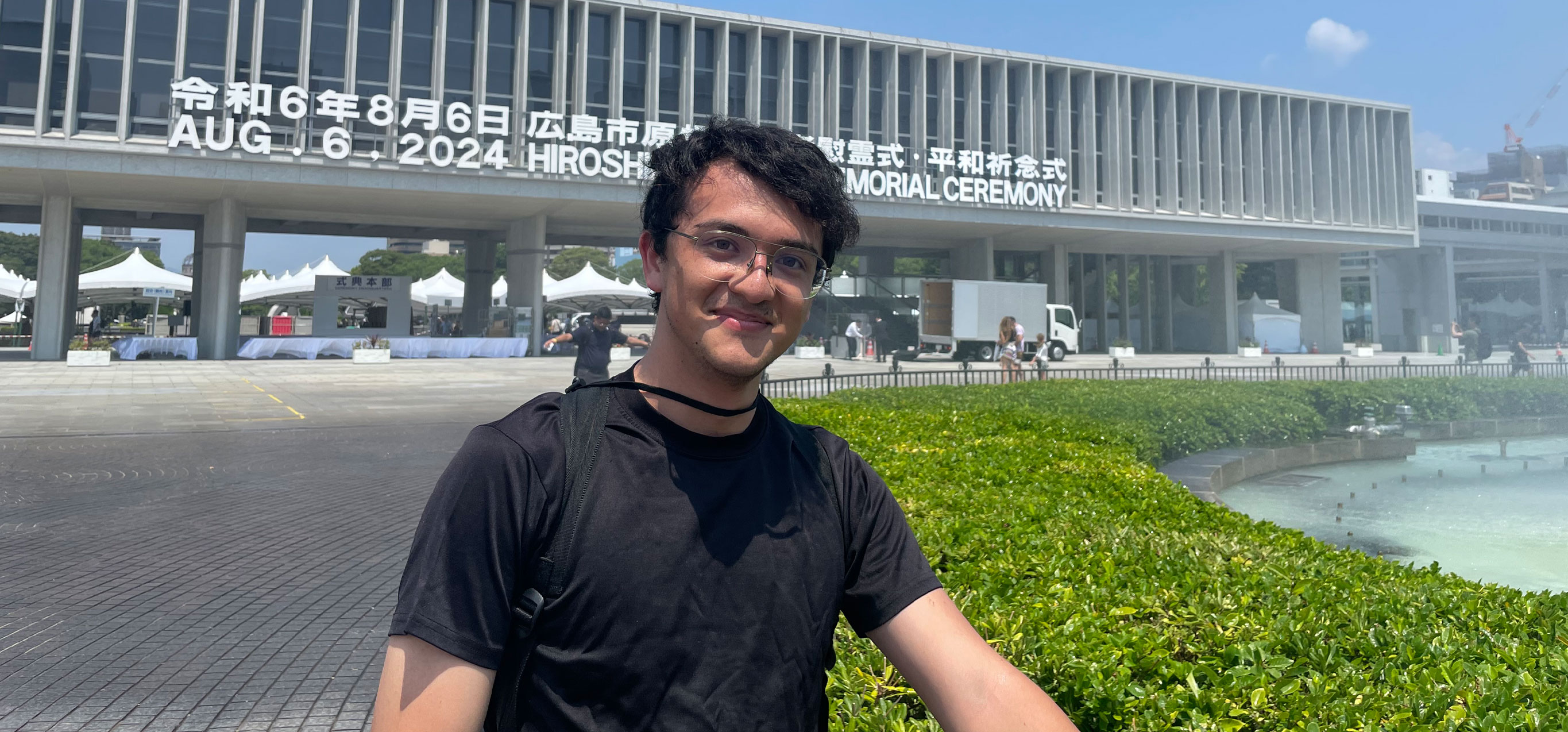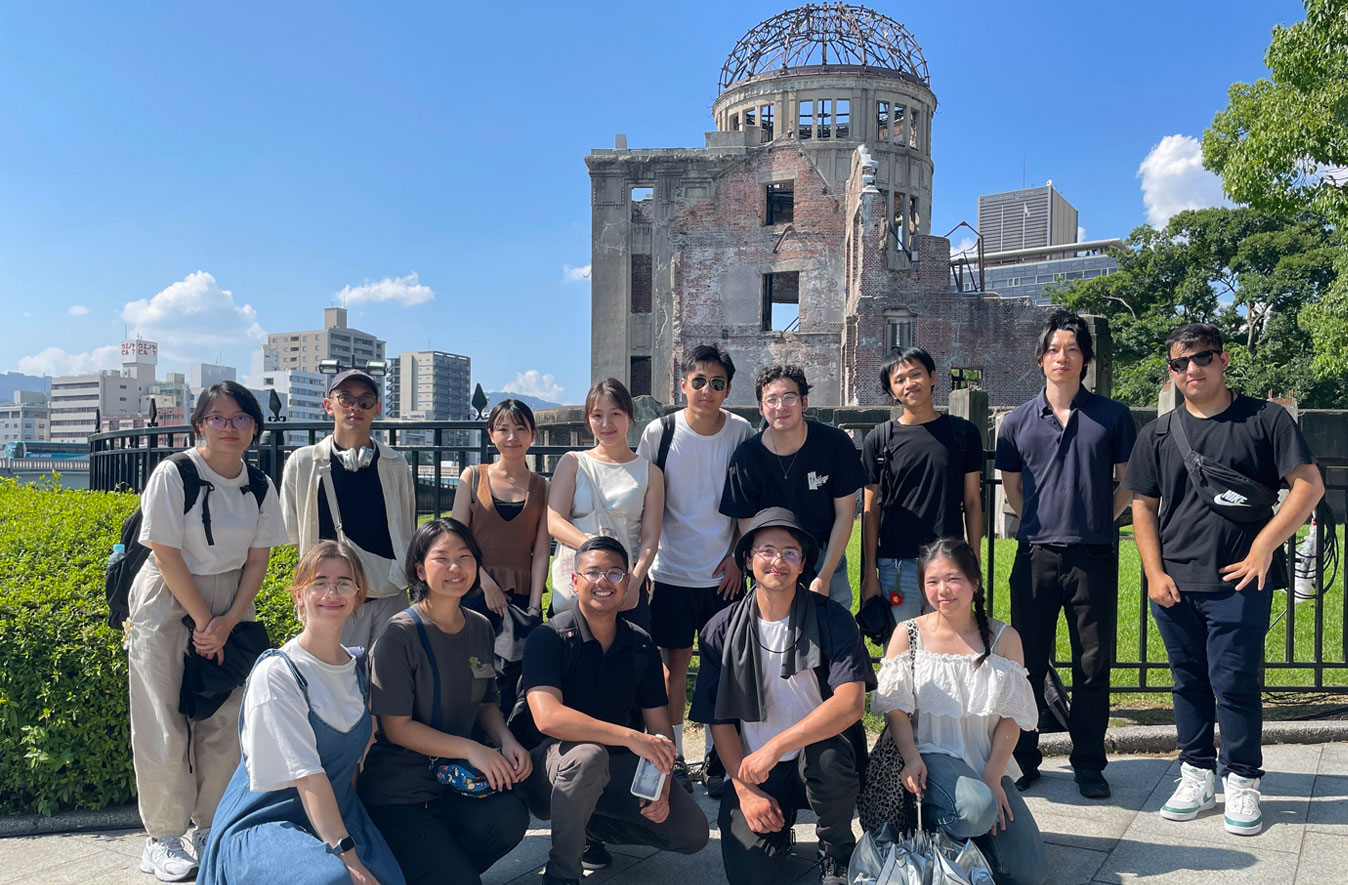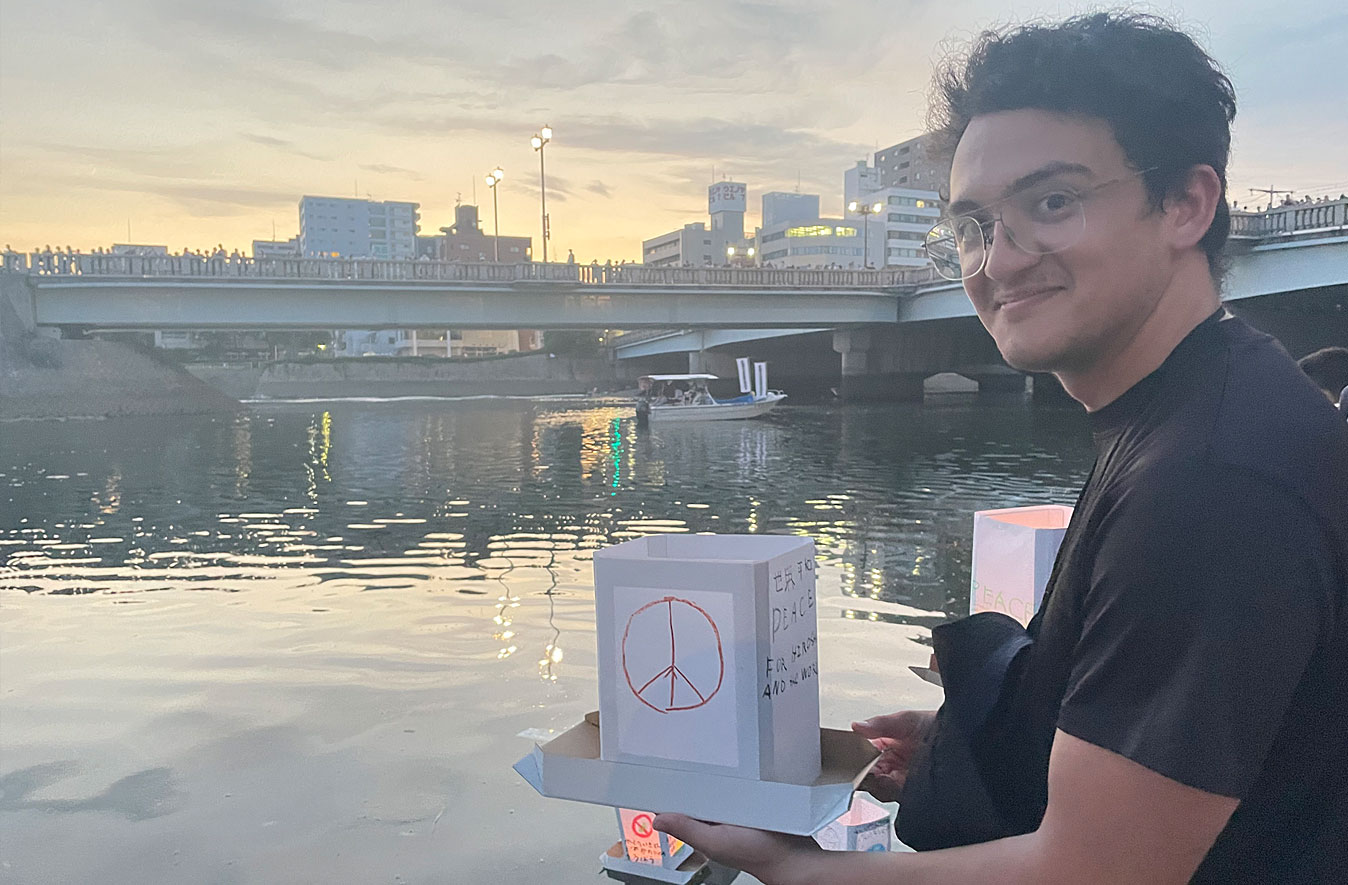
Peace Studies Seminar Hiroshima Fieldtrip: I feit it was so real how people would get involved in the crossfire – a hibakusha story inspired me to learn so as to help achieve peaceful goals.
HATANAKA Kai Masaaki
Third-year Global Studies Major
We interviewed HATANAKA Kai Masaaki, a third-year Global Studies student who participated in Hiroshima fieldtrip for the Peace Studies Seminar course on August 5-8. The itinerary included a meeting with hibakusha, surviving victims of the atomic bombs, a visit to the Peace Memorial Museum and a United Nations institute, and attendance at the Peace Memorial Ceremony 2024 on August 6. Kai looks back on his time there.
What attracted you to apply to the College of International Relations at Ritsumeikan University, and what motivated you to study Global Studies?
KaiSince graduating from high school, originally, I had no plans to attend college right afterward as I was not prepared to attend both mentally and financially. For the next two years, I worked multiple part time jobs and saved up a lot of money. I then decided I wanted to pursue something that would change my life while providing me with a sense of purpose and guide me to a passionate career path.
After applying to different institutions, I chose to attend the College of International Relations at Ritsumeikan University in Kyoto. I’ve always been interested in history and culture and Kyoto was one of the best places which embodies those factors that motivated me to enhance my learning experience. Furthermore, I once visited Kyoto since I was in high school and deeply relished the cultural city that represented traditional Japanese culture and significant temples and thought about moving here one day even as a university student. Ritsumeikan University is regarded as one of Japan’s private universities therefore this was the best decision overall.

What attracted you to participate in the Peace Studies Seminar?
KaiDuring my third year, I aimed to deepen my knowledge of Peace Studies in general as that had been one of the most important topics I studied at that time and thought it was necessary to further engage in my learning experience in that field. Additionally, I had taken most of the professor’s other lectures and gained a great amount of insightful knowledge on peacebuilding, and international organizations.
I also never had been to Hiroshima and wanted to take that opportunity to travel and explore the city while conducting field work with the rest of my classmates. Hearing from my friend’s experience of traveling there, they highly recommended that everyone should pay a visit at least once. Hiroshima was a place I never fully imagined just from my interpretation of it. It was a city which once you first visit, deep down one would feel a sense of tragedy, turmoil, and sadness regardless of what has happened in the past, while emphasizing the fact it was also a fun, beautiful and emotional experience.
Please share your most impressive things and/or what you learned in the Hiroshima fieldwork.
KaiFrom the Hiroshima fieldwork, there were honestly so many factors I could discuss because every day had been an immersive learning process. So far one of the things that I thought were impressive and insightful, was first visiting the peace museum and meeting an atomic bomb survivor. The museum portrayed aspects of tragedy and war from their perspective in the darkest manner unimaginable. Within a dark quiet exhibition room, I learned that in the museum that the victims were not only just the residents of Hiroshima, but was also prisoners of war, international students, and foreign residents who owned shops and business within the city all displayed in arts of horror.
Additionally, the most heart-saddened viewing in that area I also noticed the aftermaths of those victims who experienced severe radiation burns and developed diseases afterwards before slowly succumbing to death. I was shocked and upset after witnessing those images and began to think that war is so tragic since for one side to achieve victory means to simply make victims of opponents which ultimately results in provoking hatred and suffering. War and politics can be dangerous because in times of conflict, people would get involved in the crossfire between two sides. I thought that this heavily educates audiences and motivates people to promote peace and I felt real after being inside the museum.

KaiIn addition, the next day we attended the Peace Memorial Ceremony and met a hibakusha (atomic bomb survivor) afterward. From listening to her story, I thought that for her it was such a hard life to live after witnessing and feeling the effects of the bomb and had to endure every hardship that came by. But what I also was inspired after hearing the details was that despite all the rough experiences, she fought to advocate for peace in the world and to not have anyone else suffer the same way she did. I was the most intrigued by this experience. Although we may not be able to empathize with those who experienced tragic events fully, we should listen and learn to help achieve peaceful goals as they wish future generations to carry on for them.
The field trip included a visit to the United Nations Institute for Training and Research (UNITAR) in Hiroshima. How was your experience with the part?
KaiAs for visiting the UNITAR session and office within Hiroshima city, we learned about how this section of the United Nations operates and the official members experiences and advice. It made me think about possibly working in an international field at some point in a potential future career or at least to work and collaborate with organizations. The sessions were very inspiring, and when it comes to peacebuilding, I learned that through various theories and methods, there is no actual one simple answer to fully resolve conflicts and implement peace in societies.

KaiI thought the message the officials were trying to provide to us is not only motivating us to carry on their work for them but also continuing to seek new answers and methods from our own knowledge and experience that is crucial for improving on peacebuilding in other societies where war is still happening as of now. We need to look at different perspectives while coming up with ideas we can think of too. It’s significant as it would potentially help us in preparation for our careers.
How will your experiences in this course influence your study, activities, career and/or life?
KaiThis trip was by far the most captivating experience during my school years even just for the purpose of conducting fieldwork. I never thought it would be much better than expected and these experiences really opened up new perceptions but also reflecting how I see things based on my personality. You learn so much about new things with people you travel with, yourself and through your fieldwork of studying new facts. Therefore, I highly encourage other students to opportunities like this when you can since life is too short to miss out but so is being a student of IR.
October 2024
MORE INTERVIEWS
-
International collaboration is not merely an ideal, but something that is both achievable and essential
Tran Duc Tuan (Steven)
Honda (Graduate School of International Relations Alumnus 2015)2026.2.13
alumni|
-
Zemi Research Convention 2025 “Where do we find the laughter?”
JDP Team
(Team name: The Japarican: Trans-Pacific Humor Accord)2026.2.3
academics|jdp|openseminar|
-
Diversifying opportunities and improving oneself by crossing borders
Jameel Mikaheel Yamaguchi
Fourth-year Global Studies Major2026.1.26
studyabroad|international|gs_major|
-
I participated in the Peace Studies Seminar and engaged in meaningful discussions with peers who shared a commitment to deepening our understanding of peacebuilding and broadening our perspectives.
ONG Kristen Valeria
Second-year Global Studies Major / International Student from Singapore2025.11.5
studentlife|academics|gs_major|
-
The Bangkok International Organization Training Program Taught Me the Importance of Understanding Regions from a Broad Perspective — I Aspire to Build a Career in International Politics
RINALDI Christian Giuseppe
Second-year Joint Degree Program (AU-home)2025.10.22
academics|international|jdp|
-
Developing my Japanese proficiency enabled me to engage in a wide range of experiences during my time in Japan.
DAO NGUYEN BAO Ngoc
Third-year Global Studies Major / International Student from Vietnam2025.9.26
studentlife|international|gs_major|